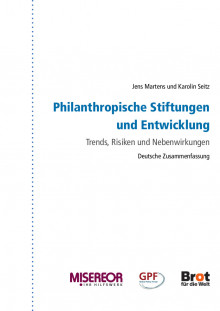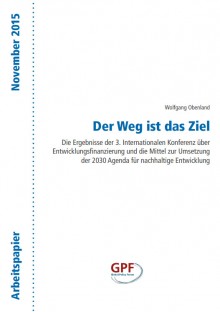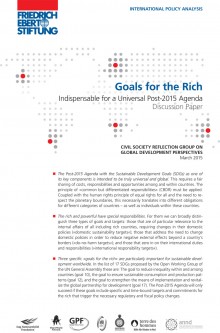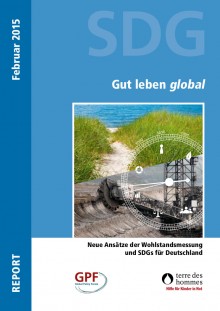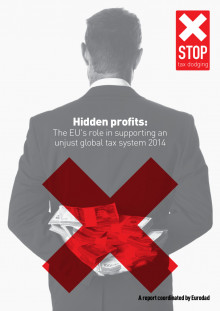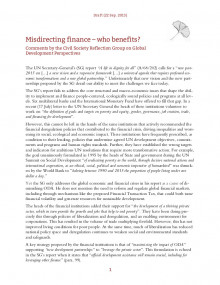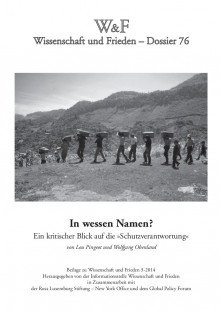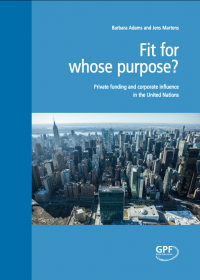
Publikationen
Globale Zukunftsziele für nachhaltige Entwicklung
Trends, Risiken und Nebenwirkungen
In der internationalen Entwicklungspolitik hat in den letzten Jahren eine Akteursgruppe in der Grauzone zwischen Zivilgesellschaft und Wirtschaft an Bedeutung gewonnen: Philanthropische Stiftungen.
US-amerikanische Stiftungen wie die Rockefeller Foundation sind bereits seit dem frühen 20. Jahrhundert in der internationalen (Entwicklungs-)Zusammenarbeit aktiv. Aber erst in den letzten Jahren haben sich mit der wachsenden Anzahl von Stiftungen und vor allem mit der Gründung der Bill & Melinda Gates Foundation deren finanzielle Leistungen rapide erhöht. In Zeiten stagnierender öffentlicher Mittel für die Entwicklungszusammenarbeit [...]
Who shapes the agenda?
Die Ergebnisse der 3. Internationalen Konferenz über Entwicklungsfinanzierung und die Mittel zur Umsetzung der 2030 Agenda für nachhaltige Entwicklung
Private funding and corporate influence in the United Nations
"Follow the money” is the recipe for good investigative journalism and Fit for Whose Purpose does precisely that for the institution created to defend global public goods. Digging into the numbers behind the funding of the United Nations, Adams and Martens uncover a trail that leads to corporate interests having a disproportionate say over the bodies that write global rules. This book shows how Big Tobacco, Big Soda, Big Pharma and Big Alcohol end up prevailing and how corporate philanthropy [...]
Indispensible for a Universal Post-2015 Agenda
New Discussion paper for the Civil Society Reflection Group on Global Development Perspectives I March 2015
The Post-2015 Agenda with the Sustainable Development Goals (SDGs) as one of its key components is intended to be truly universal and global. This requires a fair sharing of costs, responsibilities and opportunities among and within countries. The principle of »common but differentiated responsibilities« (CBDR) must be applied. Coupled with the human rights principle of equal rights for all and the need to respect [...]
Neue Ansätze der Wohlstandsmessung und SDGs für Deutschland
Wie die EU ein unfaires globales Steuersystem befördert 2014
Dieser Bericht – der zweite in einer Reihe von drei Jahresberichten – bringt zivilgesellschaftliche Organisationen (civil society organization, CSO) in 15 Ländern innerhalb der EU zusammen. Experten in jeder CSO haben die Verpflichtungen und Handlungen zur Bekämpfung der Steuerhinterziehung und Sicherstellung von Transparenz ihrer nationalen Regierungen untersucht.
In diesem Jahr wird jedes Land zum ersten Mal auch direkt mit den anderen EU-Mitgliedstaaten im Hinblick auf vier kritische Fragen verglichen: die Fairness ihrer Steuerabkommen mit Ländern des globalen Südens, ihre Bereitschaft [...]
Comments by the Civil Society Reflection Group on Global Development Perspectives
Ein kritischer Blick auf die »Schutzverantwortung«
Alleine während der vergangenen zwölf Monate kam es zu vielfachem Eingreifen auswärtiger Mächte in Konflikte in formal souveränen Ländern: im Südsudan, in Zentralafrika, in Mali, in der Ukraine und anderswo. Diese sehr unterschiedlichen Eingriffe in sehr unterschiedliche Konfliktsituationen werden naturgemäß sehr unterschiedlich bewertet: als Unterstützung in einer Krisensituation, als Prävention in einem sich abzeichnenden Völkermord oder als aggressive Einmischung in die inneren Angelegenheiten eines Staates. Wann und wie aber internationales Eingreifen gerechtfertigt oder gar geboten erscheint, darüber findet spätestens seit [...]


